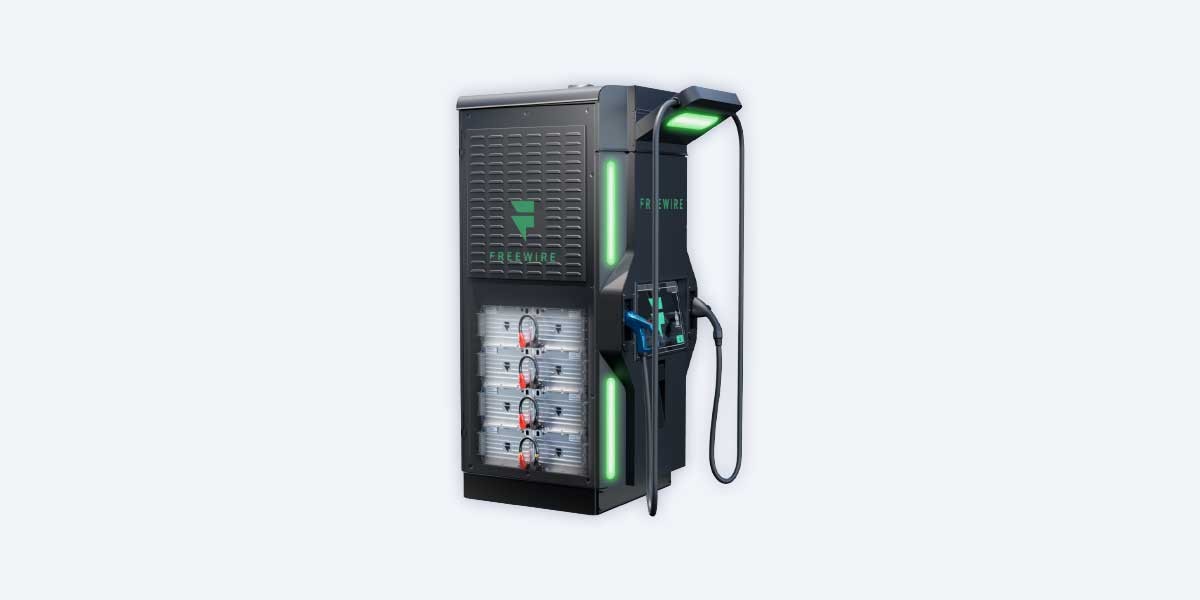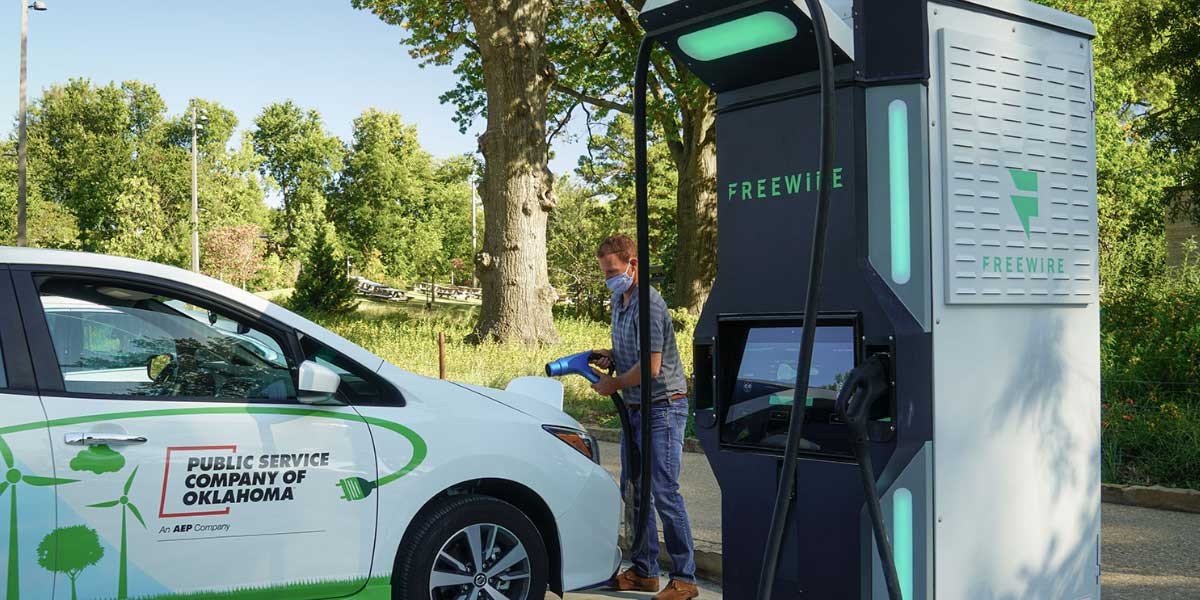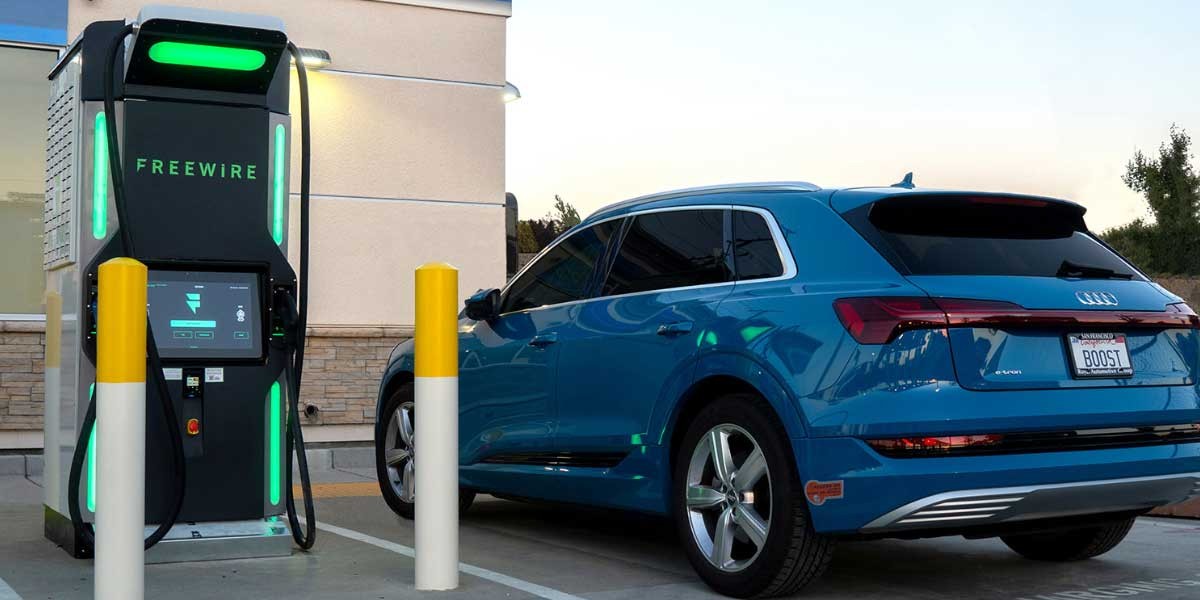Freewire Technologies Boost Charger 150
Freewire Technologies Boost Charger 150 offers rapid electric vehicle charging with up to 150 kW of power, utilizing an integrated battery to minimize grid impact. Ideal for commercial use, it ensures swift, efficient charging and reduces operational costs without the need for extensive electrical infrastructure upgrades.
User Rating: 3 / 5 (44 votes)





Starting Price: $83000 USD *
Technical Specifications:
| manufactured in | USA |
| charging power (kW) | 150 |
| voltage | 380 |
| rated current (A) | 80 |
| cable length | 3.4 |
| connector type | CCS1 / CCS2 CHAdeMO |
| simultaneous charging | 2 |
| IP rating | 54 |
* Minimum price set for the base trim by the manufacturer

Freewire Technologies Boost Charger 150 Review
Freewire Technologies Boost Charger 150: The Epoch of Ultrafast EV Charging
Imagine a device so potent in its purpose that it romps through the task of electric vehicle (EV) charging with such élan, it makes everything else seem like a tricycle beside a supercar. Enter the Freewire Technologies Boost Charger 150, a colossus in the electrifying domain of EV charging. It's not merely a charger; it's an expedition into the future of electric mobility, offering a melange of cutting-edge features designed for universal deployment. Let’s surf through the technical intricacies, price tag, and exceptional characteristics that etch the Boost Charger 150 into the annals of EV charging innovation.
A Closer Look at Technical Marvels: The Boost Charger 150
150 kW of Electrifying Gusto
The Freewire Technologies Boost Charger 150 isn’t just powerful—it’s Herculean, propelling 150 kW of charging power. It's akin to unleashing a thunderbolt that slashes the charging time, letting you vault back onto the road with scarcely a pause.
A Say on Voltage: A Hefty 380V
Bearing a robust voltage rating of 380V, the charger assures a steady and potent stream of electrons to your EV, promising rapid recharges that are as reliable as the break of dawn.
Authority in Amperage: A Stalwart 80A
With its formidable rated current of 80A, the Boost Charger 150 flexes its muscles in high-powered charging, deftly balancing swiftness with efficiency.
The Leash is Long: A 3.4-foot Cable
Adorned with a 3.4-foot cable, the charger offers not just power but pliancy, making the act of charging as convenient as a Sunday morning.
Connectivity's Cornucopia: CCS1 / CCS2 / CHAdeMO
Armed with CCS1, CCS2, and CHAdeMO connectors, it opens its arms to a myriad of electric vehicles, proving itself as a polyglot in the dialects of EV compatibility.
Dual Dreams: Charging Two Vehicles at Once
Imagined for the communal future of EV charging, it allows a pair of electronic chariots to replenish their vigor simultaneously, a boon for bustling hubs of mobility.
An Impenetrable Fortress: IP54 Rating
Brandishing an IP54 rating, this charger is not just another delicate piece of technology but a bulwark against the caprices of weather, guarding your electric vehicles and charging equipment against the elements.
The Ledger of Value: An Investment that Returns
Tagged at $83,000, the Freewire Technologies Boost Charger 150 represents not a mere expenditure but an investment into the infrastructure of tomorrow, promising returns in efficiency and service for charging station operators and businesses alike.
Into the Crucible: A Verdict on Efficiency
Championing Features
1. A Colossus of Infrastructure Efficiency: The Boost Charger 150 stands as a citadel of innovation, amalgamating energy storage with ultrafast charging prowess. This avant-garde strategy allows for swift deployment minus the labyrinth of heavy infrastructure, rendering it both cost-effective and aesthetically pleasing.
2. The Harbinger of Optimal Energy Savings: By marrying energy storage with top-tier management software, the Boost Charger 150 champions substantial reductions in energy costs. When juxtaposed with conventional charging edifices, it can trim down energy expenditure by up to an impressive 70%, ushering in an era of cost-effectiveness, resilience, and the potential for supplementary energy services.
The Freewire Technologies Boost Charger 150 stands as a sentry at the dawn of a greener and more seamless future in EV charging, with its formidable might, trailblazing features, and a steadfast commitment to efficiency.
Watch the Video Overview
Full Specifications List:
| Charging Speed and Power Output | Up to 150 kW / 201 hp |
| Connector Types and Compatibility | CHAdeMO, CCS1, CCS2 |
| Availability and Accessibility | 24/7 public access |
| Cost and Pricing Models | $0.20-$0.50/kWh (€0.17-€0.43, £0.15-£0.39/kWh) |
| Charging Station Features | Remote management, Mobile payment options, Over-the-air updates, LCD touchscreen |
| Price | $83,000, €73,000, £63,000 |
Comparison:
Charging Speed and Power Output
When it comes to brute power, the Freewire Boost Charger 150 delivers with a charging capacity of up to 150 kW. In comparison, the ChargePoint Express 250 edges higher at 250 kW. The ABB Terra HP flexes its muscles at 150 kW as well, while the heavyweight champion here, the Tesla Supercharger V3, clocks in at a whopping 250 kW.
Connector Types and Compatibility
The Freewire Boost Charger 150 champions flexibility with CCS and CHAdeMO connectors, embracing a wide variety of EVs. Match that to the ChargePoint Express 250, offering CCS1 and CHAdeMO. The ABB Terra HP maintains support for CCS and CHAdeMO connectors too. Meanwhile, the Tesla Supercharger V3 remains exclusive with the proprietary Tesla connector, appealing mainly to Tesla enthusiasts.
Cost and Pricing Models
Shelling out $83,000 (around £62,000 or €76,000) lands you the Freewire Boost Charger 150. For a premium leap, the ChargePoint Express 250 hits the scales at around $100,000 (£75,000 or €92,000). The ABB Terra HP demands a similar $80,000 (£60,000 or €73,000). Tesla, never shy about price tags, sets their Supercharger V3 at a cool $100,000 (£75,000 or €92,000).
Availability and Accessibility
The Freewire Boost Charger 150 embraces a mobile design, making it more accessible to a variety of locations and scenarios—a true vagrant. The ChargePoint Express 250 and ABB Terra HP find their homes primarily at commercial hubs and transit points, blending seamlessly into urban jungles. The Tesla Supercharger V3 is widespread but, alas, remains niche within Tesla’s dominions.
Charging Station Features
The Freewire Boost Charger 150 boasts battery-integrated technology that offers a swift and stable charge despite fluctuating local grids. Think of it as the Swiss Army knife of EV charging. Truth be told, the ChargePoint Express 250 ensures dynamic power sharing among stalls, cranking up the efficiency factor. The ABB Terra HP, with its modularity and simultaneous charging capabilities, also screams efficiency. Adding a layer of brilliance, the Tesla Supercharger V3 features liquid-cooled cables, which translate to lighter and more flexible handling.
Price
For those counting the pennies and pounds, the Freewire Technologies Boost Charger 150 stands at an inviting $83,000 (£62,000 or €76,000). ChargePoint Express 250 rolls up with a $100,000 (£75,000 or €92,000) tag. ABB Terra HP aligns closely at $80,000 (£60,000 or €73,000), whereas the Tesla Supercharger V3 circles back with a similar $100,000 (£75,000 or €92,000).
So there you have it, techno-enthusiasts and everyday pragmatists, the battlefield laid bare. Each station flaunts its acumen, but the Freewire Technologies Boost Charger 150 finds its unique podium in flexibility, affordability, and versatile deployment.Frequently Asked Questions(FAQ) about Freewire Technologies Boost Charger 150
What is the power output of the Freewire Technologies Boost Charger 150?
The Freewire Technologies Boost Charger 150 has a power output of 150 kW.
What connectors does this charging station have?
This charging station supports both CCS (Combined Charging System) and CHAdeMO connectors.
Is this charging station for home?
The Freewire Technologies Boost Charger 150 is designed for commercial use, not for home installation.
How long does it take to charge an electric vehicle with this charger?
Charging time depends on the vehicle's battery size. For a car with a 60 kWh battery, it would take around 24 minutes to charge from 20% to 80%.
What is the cost per kWh or per minute of charging?
The cost varies by location and electricity provider but typically ranges from $0.20 to $0.50 per kWh.
Are there any incentives or grants for installing EV chargers?
Yes, many governments offer incentives and grants; for example, the U.S. federal government offers a tax credit of up to 30% of the installation cost.
Can this EV charging station be used for all electric vehicle models?
Yes, the Boost Charger 150 can be used for all electric vehicles that support CCS or CHAdeMO connectors.
What is the total cost of ownership for an EV charger?
Total cost includes the purchase price of $83,000, installation fees, and electricity costs. Maintenance costs are relatively low.
What are the environmental benefits of using EV charging stations?
Using EV charging stations like the Boost Charger 150 reduces greenhouse gas emissions and reliance on fossil fuels, contributing to a cleaner environment.










